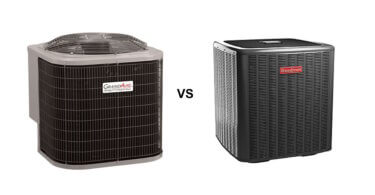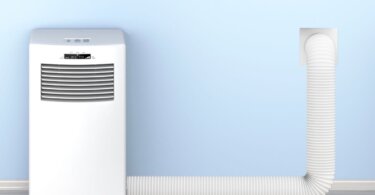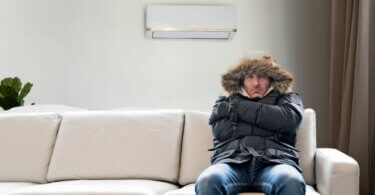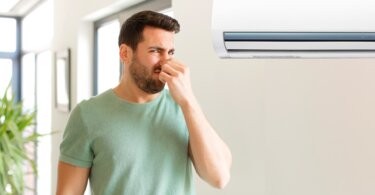When you’re feeling under the weather, do you blame the cold weather? Or do you think it’s a chill you picked up from running the air conditioning? If you’re wondering whether an AC can make you catch a cold, here’s your answer:
While some risks are associated with using air conditioners, catching a cold from AC is not usually one of them. Although an AC’s dirty filter can cause allergies and continuous sneezing, catching a common cold because of the AC is still a long shot.
Now, the answer is not always straightforward and some other AC-related factors can also trigger your common cold. That’s why we’ll explore whether or not air conditioning can impact your body temperature and leave you with sickness symptoms.

Can you Catch a Cold From Air Conditioning?
It’s possible to catch a cold from air conditioning, but it’s not very common. The viruses that cause the common cold are spread through contact with respiratory secretions, such as saliva, mucus, or blood. So unless you’re coming into close contact with someone who is already infected, it’s unlikely that you’ll catch a cold from air conditioning.
However, there are other ways to catch a cold from air conditioning systems. For example, if the air conditioning unit isn’t properly maintained and is harboring dust and dirt particles, you could potentially breathe in those particles and get sick.
Or if the buildings with air conditioning have accumulated plenty of water or are exposed to moisture, that could also create an environment where bacteria and viruses can thrive. Poorly maintained air-conditioned spaces have constantly low indoor temperatures, which can harbor airborne particles and compromise your indoor air quality.
The Science Of Colds
The science of common colds suggests a correlation between air conditioning and the common cold, but there is not yet any definitive proof.
One theory is that cold temperatures lead to a drier environment, which in turn can decrease the effectiveness of the mucus that lines our nasal passages and helps fight off infection.
It’s also possible that exposure to colder, drier air may make it more difficult for our respiratory system to function properly and fight off infection.
However, it’s important to note that more research is needed to determine whether or not air conditioning causes or exacerbates the common cold.
How Can An Air Conditioner Spread Germs and Mold?
Air conditioning can spread germs and cause colds because it lowers the humidity in a room, which dries out your nasal passages. When your nasal passages are dry, they’re more susceptible to disease from viruses in an air-conditioned environment.
When you have a comfortable indoor temperature, these viruses cannot grow at a rapid pace and the chances of extreme temperature swings reduce.
Another way that air conditioning can lead to colds is by chilling your respiratory system. When your respiratory system is chilled, it’s less effective at fighting off infection. This makes you more susceptible to a cold virus and turns your air-conditioned room into a breeding ground for common cold germs.
Since an air-conditioned environment provides the ideal temperature for infectious particles, addiction to air conditioning can be bad for your health.
Air-conditioned office buildings have a barrier against the outdoor heat and become a ground for mold as a result. If a room often has super-low temperatures, it gets plenty of virus particles because of the stagnant water.
Sadly, this water damage isn’t limited to mold spores, and air-conditioned people often face cold symptoms because of airborne contaminants.
Ways To Prevent Colds and Sore Throat In Air-Conditioned Environments
Here are a few key things you can do to prevent colds from spreading in air-conditioned environments:
1. Clean Air Conditioner Regularly
First, clean and disinfect all air conditioning units as well as your house regularly. This will help remove any potential sources of respiratory infection that can spread during the time in air conditioning.
An average air conditioner has some stagnant water that can become a breeding ground for viral particles. If you maintain regular maintenance of your air conditioner, the chances of you catching a cold will reduce.
2. Maintain Proper Ventilation in Home
Second, keep the air circulating by using fans or natural ventilation. This step will reduce the risk of stagnant air becoming a breeding ground for bacteria and viruses. Also, the fan will maintain warmer temperatures to keep mold spores at bay.
Take Care of Your Hygiene
Finally, it’s smart to cover your mouth and nose when coughing or sneezing and to wash your own hands regularly.
By taking these simple precautions, you can help to reduce the spread of colds in air-conditioned environments.
Summing Up
As the weather gets warmer, many people begin to use their air conditioning systems daily. However, only a few people realize that their air conditioner can be a source of allergies and illness.
Dust, mold, and other pollutants can easily build up inside the unit, causing common cold symptoms like sneezing and congestion. In addition, air conditioners can also circulate pollen and other allergens throughout your home.
To prevent these problems, it is important to keep your air conditioner clean. Regularly dusting the unit and changing the filter can make a big difference in your health. In addition, you may also want to consider investing in an air purifier to help remove allergens from the air. By taking these simple steps, you can enjoy the warm weather without suffering from seasonal allergies.
Also, read our Air Conditioners Buyer’s Guide.
FAQs
What is Air Conditioning Sickness?
Air conditioning sickness is a rash that some people get when they spend a lot of time in air-conditioned spaces. The rash is caused by an allergic reaction to the chemicals used in air conditioning units. You can treat this issue with over-the-counter medications, and it usually goes away on its own after a few days.
What are the Reasons for Air Conditioning sickness?
Air conditioning sickness can be caused by exposure to cold, dry air. Air conditioning sickness symptoms include headache, fatigue, dizziness, and nausea.
There are several theories as to what causes air conditioning sickness, but the most commonly accepted one is that it is caused by dehydration. When the body is exposed to cold, dry air, it loses moisture faster than it can replace it, leading to dehydration.
Can Air Conditioning Make You Sick?
It’s possible that air conditioning can make you sick and lead to a sore throat and dryness of nasal passages. It all depends on how well the unit is maintained and how often it’s used.
If the air conditioner isn’t properly maintained, it can become a breeding ground for mold, bacteria, and other unhealthy contaminants. When these contaminants are circulated through the air, they can cause respiratory issues, headaches, and other symptoms. If you’re using your air conditioner regularly, it’s important to have it serviced regularly to prevent these health problems.
Related article: Can Dogs Get Sick From Air Conditioning?





Leave a Comment